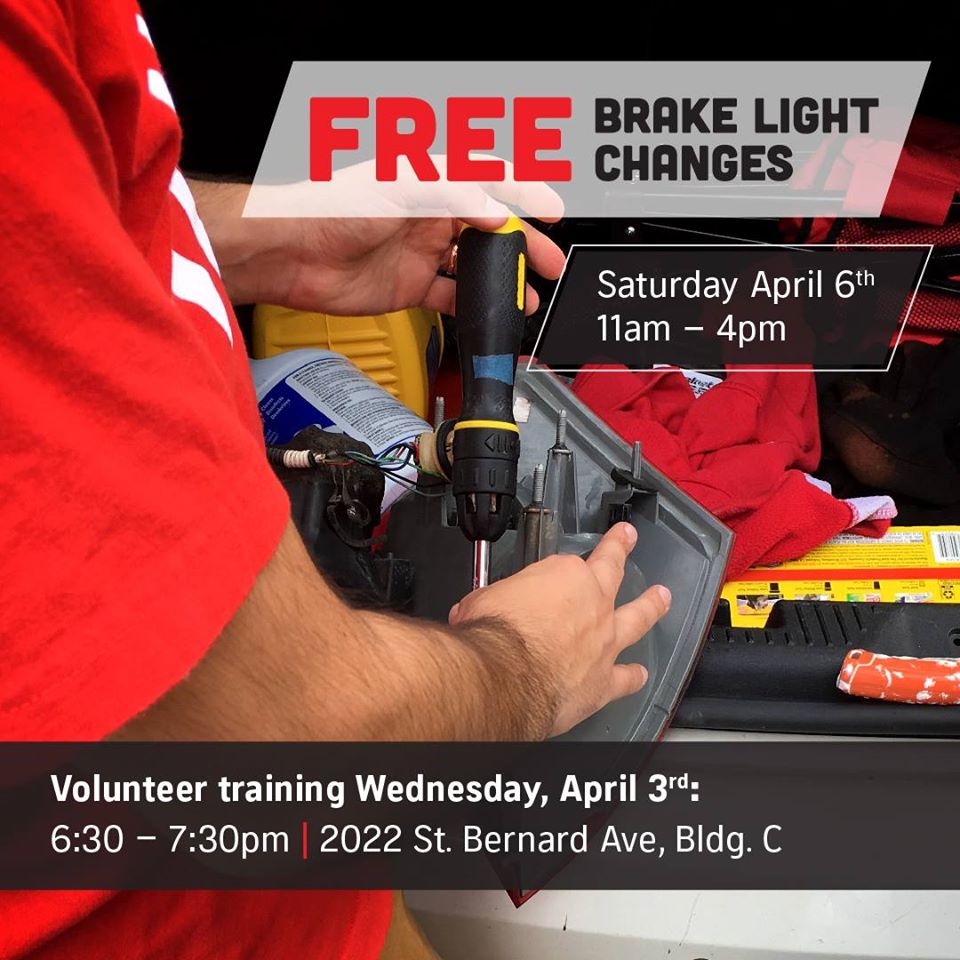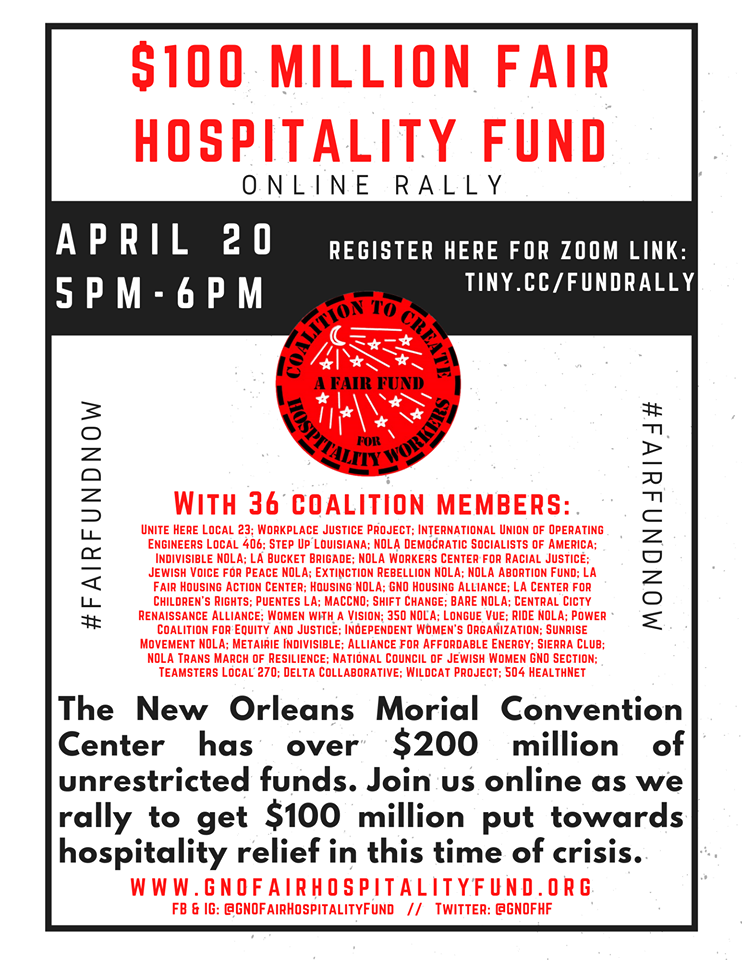Michael Esealuka transcription
Posted July 2, 2020
I’m going to talk about mutual aid and labor organizing, out of my experience with unemployment workshops and tax clinics that New Orleans DSA has been doing as a part of our Fair Fund campaign.

DSA New Orleans launched the first Brake Light Clinic project which got taken up by other DSA chapters. We basically fix brake lights for free in an agitational way of raising awareness about police violence and state violence.
At first, we got a lot of criticism and a lot of blow-back that said our project was a form of charity and this led us to do some internal struggling and political development. We’ve come out of that with an understanding that mutual aid is a tactic and as a tactic, it can only really be evaluated within the framework of a larger campaign–how effective it is in advancing your campaign’s goals.
As socialists, you know, we’re fighting for more working-class power, we’re fighting to capture the state, and services can be a way of building trust with the communities of people that we’re trying to bring into our fight. But we can’t evaluate whether mutual aid is good or bad on its own. That’s like saying is canvassing good or bad; are petitions good or bad.
I’ll just talk a little bit about our campaign right now. In New Orleans, we were really, really hard-hit by the Covid crisis. For a while we had the highest per capita rate of cases in the country. Our neighboring parish, St. John the Baptist, has the highest per capita rates of death from COVID-19 in the country. And, of course, our economy is very heavily reliant on service and tourism. We estimate there are between 85,000 and 100,000 restaurant workers in the greater New Orleans metropolitan area, so they constitute a massive section of our workforce.
Rank and File Trade Union Activity and the Upcoming Teamsters Election (Part 2) – Solidarity Radio
The New Orleans convention center oversees a reserve fund that is made from hotel and tourism taxes. They have an annual revenue of at least $30 million a year and right now they are sitting on $186 million of unrestricted funds, like a rainy day fund.
Community organizers in our city have been trying to get our hands on this money for a long time; that money is made from the work that restaurant workers do in our city. So, DSA did some research to figure out who is our target and we came up with a demand that we wanted $100 million of that relief fund to be allocated evenly, with no means testing and no restrictions, to every single restaurant worker in the city. That sounds like a lot of money, but it’s actually only $1,000 per worker.

We teamed up with UNITE HERE and other local unions, working class community groups and labor organizations to build a coalition around a campaign for $100 million in relief that now includes around 37 organizations. Our coalition included sex workers’ organizations and immigrants’ rights organizations.
In the first phase of the campaign we used unemployment trainings and tax clinics as a way of bringing people in. Tourism involves not only restaurant workers and hotel workers but also taxicab drivers, Uber drivers and gig workers like dancers, sex workers, psychics, musicians, all sorts of things. These are people who fall through the cracks. Separate from this campaign, we also set up a mutual aid Facebook group that our members bottom line. There are about 6,800 people in that mutual aid group. We also organized a petition drive and got about 1,800 signatures—most of them (about 1,200) unemployed hospitality workers, so we had a base of about 8,000 people for our campaign.
We began the campaign by hosting regular tax clinics for independent contractors to teach them how they could file a simple tax form so that they could qualify for the $1200 relief check. And then we also were setting up unemployment workshops. We partnered with a local, nonprofit organization called the Southeastern Louisiana Legal Services, so they were able to provide expertise and we provided access to workers. These workshops were organized by laid off restaurant workers teaching other hospitality workers how to file for benefits. And we pulled participants from those workshops into helping us set up future workshops. And all of these people became part of the mutual aid Facebook group.
And we used these trainings as an agitational tool. We said, you know, why is it that the people who need this money most are always the people who fall through the cracks? How is it that we are the people that keep this city running and we know that the city of New Orleans runs because of the work we do and yet we’re getting left in the gutter by the people who’ve gotten rich off of our work?
Our coalition did win $1 million from the reserve fund to be given to workers in the city, and we also won an additional $1.5 million in grant funding that our coalition is going to be distributing to members of our organizations however we see fit. So, we won $2.5 million; though we didn’t get all the way to the $100 million we demanded.
Our tax clinics were really effective in the first stage of the campaign. Now, most people have filed for unemployment and so we have shifted to partnering with the many mutual aid organizations that have sprung up in the city, organizations that just provide services without political education. For example, the Greater New Orleans Caring Collective started around March 15th and they’ve really quickly established this incredible infrastructure. They’ve been able to distribute fresh food and other services to a thousand working class families across the greater New Orleans area, and they have this desperate need for volunteers. So, rather than set up our own mutual aid system, we partner with them. They get access to our volunteers and we get access to working class families that we can work with around political education.
Just to reiterate, mutual aid is a tactic; it has to be understood within a framework of a broader campaign around demands. It is a way to bring working class people into your struggle and to build trust; but it’s not enough on its own.
Michael E. was a restaurant worker for eleven years and is now an environmental organizer. She is a member of the New Orleans DSA chapter and on the steering committee of the DSA labor commission.
